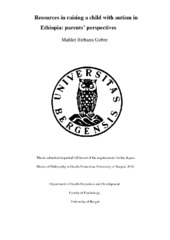Resources in raising a child with autism in Ethiopia: parents' perspectives
Master thesis
Permanent lenke
https://hdl.handle.net/1956/12948Utgivelsesdato
2016-05-20Metadata
Vis full innførselSamlinger
Sammendrag
Background: This thesis contributes to the topic of autism in an African context by studying the experiences of parents raising a child with autism in Addis Ababa, Ethiopia. The majority of publications that focus on autism are based on studies conducted in North American and European nations. There are limited publications available on the topic of autism in an African context and these publications rarely address autism from parents' perspective. Ethiopia is a nation located in Eastern Africa. The number of children affected by autism is continuously growing in Ethiopia while the awareness of autism in most Ethiopian communities is low to non-existent. In these communities, developmental disorders such as autism are regarded as an evil-spirit phenomenon. In Ethiopia, in addition to emotional and financial challenges, parents raising a child with autism suffer from lack of autism awareness in their communities. This thesis will explore culturally sensitive parent coping mechanisms that would allow managing autism for families in Ethiopia. Objective: The general objective of this research is to explore the experiences of parents raising a child with autism. The following four research questions are addressed. What were the stressors experienced by parents when finding out about the disorder of their child? What Generalized Resistance Resources (GRRs) do parents identify that strengthened them to cope with situation? Were there any consistent behaviors of the child that contributed for better understanding about the situation? Was there identifiable SOC in the coping process of the parents? Theoretical framework: For this study Salutogenesis theory was applied, which focuses on the resources that create health rather than focusing on what causes disease. Salutogenesis theory has two main components: Generalized Resistance Resources (GRR) and Sense of Coherence (SOC). By exploring the strengthening and positive resources available to parents that are raising a child with autism, it was possible to identify coping mechanisms that allow for the health and well-being of families with autism. Methods: This study employed a qualitative research method to acquire understanding of a certain phenomenon through exploration instead of measurement. Among the various approaches used in a qualitative research method, a phenomenological approach was implemented in this study in order to facilitate the understanding of parents' experiences of raising a child with autism as viewed by the parents themselves. Data collection for this study was conducted in two organizations located in Addis Ababa, Ethiopia. The data were collected through focus group discussions, individual interviews and observations during a three-month period from mid- June to mid-September 2015. Fifteen parents of children with autism and four staff were enrolled in the study. All the interviews were conducted in the local language, Amharic. Therefore, the transcription step involved two steps; transcribing recordings to Amharic and then translating to English. The data were analyzed using the method of thematic network analysis. Permission to do the study was obtained from the required organizations in Ethiopia and Norwegian Social Science Data Services (NSD). Informed consent was obtained from all the participants prior to conducting interview. Results and discussion: The experiences of parents were grouped into initial stressors and ongoing stressors. All parents reported that their initial stressor was their first experience of observing unusual behavior in their child. After the initial stressor, parents continue to feel additional challenges of raising their child with autism also termed as ongoing stressors. Most parents reported that their ongoing stressors arise from financial constraints and social isolation. Most parents kept their child’s situation a secret to avoid stigma, however, some reported to have shared their child’s situation to some friends. When asked about their positive resources, most parents indicated that knowledge and understanding of their child’s condition helped them to accept the situation and become stronger. All parents also reported that their belief system is one of their strong resources. In addition, the role of special schools for children with autism was also reported by parents as one of their positive resources. These schools hold monthly meeting for parents to discuss their experiences. Most parents reported that this monthly meeting with other parents who are in the same situation is an important coping mechanism. Conclusions: The major stressors that were highlighted by partic ipants in this study are the lack of awareness about autism in the society and the lack of facilities designed for children with autism. In relation to positive resources, all parents agree that the two organizations are major resources. Some parents reported financial stability as being an important resource. In addition to external resources, parents highlighted that full acceptance of their child’s situation is the most important resource in their coping process. Several of the participants can be said to have built a strong sense of coherence, which is related to the strong belief that they will overcome various types of stressors and build a healthy lifestyle.
